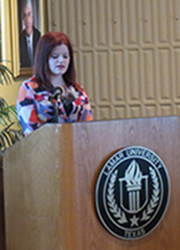Clinical Colloquium
The speech-language pathology clinical colloquium provides opportunities for graduate students to develop their presentation skills. The colloquium is a series of presentations each fall and spring semester. All students have an opportunity to develop a clinical or research presentation. Student also facilitate open discussions.
Academic Year 2014-2015
Presenters: Brittany Veazey and Abigail Wallace
Speech-language pathologists and student clinicians face challenges in their treatment sessions based on the personality of their client. Presenters described a client who opted voice therapy as a way to avoid her recommended line of surgery.
Presenters: Elsa Tran and Jacie Woodson
Presenters discussed the use of reading strategies as well as vocabulary expansion to target reading comprehension success with a child with hearing impairment. Focusing on a case study, presenters discussed evidence-based practice related to the role of the SLP in reading comprehension.
Presenters: Blake Sayers and Meagan Hartwick
Presenters discussed a modified picture exchange communication system for a child with autism spectrum disorder that shows characteristics of hyperlexia. Presenters explored the adjustments they made for individual needs of their client’s success.
Presenter: Paula Boudreaux
Presenter discussed Vocal Fold Atrophy and the Aging Voice focusing on the anatomical and physiologic changes in the aging client and effects on communication. Presenter explored causes and interventions. Client case study was presented with clinical findings, progress, and intervention strategies.
Presenter: Caitlin Harvey
Presenter discussed the use of Visual Schedules to facilitate structured therapy sessions. Presenter discussed various types of visual schedules and the different uses for each type. Presenter provided clinical application of visual schedules. Evidence-based practice to support the use of visual schedules was included.
Presenter: Kearston Burton
The presenter discussed the case study of a client who has been diagnosed with Vocal Fold Atrophy, which is secondary to Laryngopharyngeal Reflux and Muscle Tension Dysphonia. Topics covered included the client's case history, referral, evaluation, and treatment methods. The client was in attendance to offer his personal experience and answer any questions.
Presenters: Lindsey Call & Brooke Crowell
Presenters discussed the use of the Lidcombe Program to address a fluency disorder in young children under the age of six. Presenters discussed how verbal contingencies implemented under the Lidcombe Program can reduce disfluent speech in young children. Finally presenters explained the importance of parent/caregiver participation in the program and share their experiences with utilizing the Lidcombe program.
Presenter: Laura Jackson
Presenter discussed the use of Augmented and Alternative Communication devices to address impaired functional communication in children with Autism. Presenter explored available options for communication devices, the application process, insurance and cost to patient, as well as the importance of time. Finally, the presenter instructed clinicians on how to create their own AAC device using programs that are often available in schools.
Presenter: Emily Freiberg
This presentation discussed introducing an AAC device to a nonverbal child who has multiple disabilities. Presenter discussed client background, current developmental level, current progress, and future expectation of device implementation.
Presenter: Molly James
Will tonsillectomy and adenoidectomy affect speech and language development? Presenters described a client who had normal speech and language before surgery, but now presents with hypernasality post-surgery. This colloquium discussed how the two surgeries are preformed and the role of oral structures in speech and language. Additionally, research was presented to explain the change in speech that occurred post-surgery for this client.
Presenters: Caitlyn Cunningham and Justin Evans
Presenters discussed development of compensatory strategies in a young adult with a history of speech and language impairment. Presenters provided client’s background information including his clinical diagnosis and prior therapy treatments. They provided rationale for current goals and management techniques. The colloquium concluded with a description of progress.
Presenter: April Jackson
Presenter discussed research done previously by Dr. Nandhu and Dr. Harn on a case study of a 21 year old male with Aspergers syndrome targeting prosody.
Presenters: Taylor Miguez and Vanessa Smith
Presenters discussed the use of school-based therapy within the areas of inclusion and collaboration. Evidence-based practice was highlighted.
Presenters: Austin Granger and Ashlee Collins
Presenters discussed RtI (response to intervention) and current legislation related to speech and language components of the IDEA 2004. Focusing on the available literature, presenters explored SLP application of RtI and the most recent government regulations.
Presenters: April Bonton and Lindsey Sorrell
Presenters discussed the use of third-person behavioral analysis to address impaired executive functioning skills secondary to traumatic brain injury. Focusing on a case study, presenters explored application of initial stages of this technique and generalization of skills.
Presenter: Kendall Williams
Presenter discussed cultural sensitivity when providing clinical services to the Transgender Population. The presenter informed clinicians about ASHA Principles of Ethics rules and how SLPs cannot discriminate based on race or ethnicity, gender, gender identity/gender expression, age, religion, national origin, sexual orientation, or disability.
Presenter: Rosie Brown
Presenter discussed how stigma plays a role in adults who stutter. Focus included secondary behaviors and being an effective communicator. Stages a person who stutters experiences on the journal to acceptance were described. Ethics for SLPs treating adults who stutter and evidence based practices were included.
Presenter: Lindsey Sorrell
Presenter discussed current research on the use of the McNeill Dysphagia Therapy Program with a patient diagnosed with idiopathic subglottic tracheal stenosis. Specific research questions and hypotheses were discussed as well as current outcomes and implications.
Presenter: Sarah Lyons
Presenter discussed accent modification training for non-native English speakers with a focus on segmental and suprasegmental aspects of speech. Within the program, non-native English speakers are taught both to help improve intelligibility rating.
Presenter: Carmyn Thompson and Maureen Ehrlich
Presenters report on their Project Talk experience. Project Talk is a one-week summer camp hosted by The Center for Hearing and Speech in Houston, Texas. This organization specializes in treating children with hearing loss.


